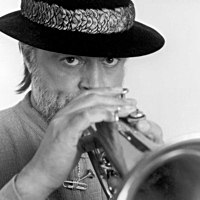Home » Jazz Articles » Catching Up With » Chuck Mangione: Back On Track
Chuck Mangione: Back On Track
[Dizzy said,] Your horn is like your woman. If you don't hug her during the day, at night when it's time to play, there won't be nothin' happenin'.
For three decades, Chuck Mangione's infectious energy, unbridled enthusiasm, and pure joy have defined his deep passion for music. Born and raised in Rochester, New York, he first garnered attention playing with the Jazz Brothers alongside his older brother, Gap. Chuck later left home to join Art Blakey and the Jazz Messengers, stepping into the trumpet chair once held by Clifford Brown, Lee Morgan, and Kenny Dorham.
Mangione's breakthrough came with his 1976 album Bellavia, which earned him his first Grammy. The following year, his album Feels So Good became a global sensation, propelled by its title track, which became one of the most instantly recognizable melodies in the world. In 1978, his Children of Sanchez album brought him a second Grammy. Not stopping there, his Emmy-winning "Give It All You Got" was famously chosen as the theme for the 1980 Olympics, heard worldwide.
Chuck continued performing and recording until 1988. After a nearly decade-long break from recording, he recently returned to the studio to create a fresh collection of heartfelt and imaginative songs. His new album, The Feeling's Back, features a mix of original compositions and familiar bossa nova tunes, capturing the timeless spirit of his early A&M days and showcasing a master at the peak of his craft.
Earlier this month, I exchanged a few emails with Chuck, which led to this Q&A.
All About Jazz: Thanks to your parents, you had the unique opportunity to meet several jazz greats while growing up in Rochester. Who were some of the musicians your mom and dad had over for dinner?
Chuck Mangione: Dizzy, Kai Winding, James Moody, Junior Cook, Sam Jones, Junior Mance, Charlie Ventura, Carl Fontana, Art Blakey, Sarah Vaughan, Carmen McRae, Ron Carter... to name a few. All were at Mama and Papa Mangione's table.
AAJ: How did your time with Art Blakey's Jazz Messengers come about?
CM: I met Dizzy and (of course) Art Blakey as a teenager in Rochester, NY. When Freddie Hubbard left the Jazz Messengers, Art called Dizzy for a recommendation. Diz said, "Remember the kid from Rochester?"
AAJ: Did you feel comfortable playing within the hard bop idiom?
CM: My roots are in hard bop. I was weaned on hard bop. It's the format I feel most comfortable in.
AAJ: Dizzy Gillespie was a close family friend. What important lessons or wisdom did you learn from him that still resonate in your life today?
CM: Dizzy said to me one time, when I showed up without my horn, "Your horn is like your woman. If you don't hug her during the day, at night when it's time to play, there won't be nothin' happenin.'" And Diz, as great as he was a creative player, knew that this was a business. He taught me that if you want to just play whatever you want to play without considering the audience—fine. But don't expect to make a living at it. Enjoy what you do, sure. But remember, there's an audience out there.
AAJ: Do you hold any academic degrees? If so, where did you earn them?
CM: I have a Bachelor of Arts degree with a major in Music Education from the Eastman School of Music, plus an honorary doctorate from the Eastman School of Music.
AAJ: How has your sound evolved over the years? Land of Make Believe sounds different from Bellavia, which sounds different from Feels So Good.
CM: Every piece of music is like a painting. It should be able to stand alone and be appreciated forever, if it is good. The common thread in Bellavia (my Mother's Day gift to my Mom—Bellavia is her maiden name), "Land of Make Believe," "Feels So Good," "Aldovio," "Leonardo's Lady," etc., is melody. I love melodies. People remember melodies. They react to melodies.
AAJ: Have you collaborated with orchestras in recent years, as you did with Hill Where the Lord Hides and Land of Make Believe? Any plans to do so again?
CM: Recently, we performed with the Jacksonville Symphony as well as with an orchestra at a film and music festival in Poznan, Poland. Last November, I toured with a 28-piece orchestra, which included vocalist Dianne Reeves.
AAJ: Did the success of Feels So Good impact your subsequent projects? Did you feel pressured to create another hit record? If so, where did that pressure come from—your record company, fans, or yourself?
CM: With all of its success, Feels So Good brought confrontation. The record company was drooling for another LP with the same sound and instrumentation, and I gave them a double LP (Children of Sanchez) which was totally unlike Feels So Good. "Sanchez" became a gold album. It was still probably not a good "business" decision on my part, but certainly an honest musical one.
AAJ: Why did you take an extended break from recording?
CM: I stopped making music as a performer and recording artist, I believe at the end of 1988 after almost 20 years of nine months of mainly all over the world and an album a year as well. My batteries needed recharging. I felt numb, so I stopped. I had had an ongoing, daily relationship with music for 40 years. My stopping scared a lot of people, but it didn't scare me; it presented me with a brand new set of circumstances. Someone always handed me an itinerary as to what time I needed a wake-up call or shower, room service brought our bags out to a cab, and we went to another airport to another hotel, soundcheck, gig, etc.
AAJ: It's difficult to break from a life's passion. Did you consciously do things during this time to keep music at a distance? Or did you think about it, but in different terms?
CM: When I stopped performing, I didn't know what to do when I woke up. I didn't have to wake up. The window was wide open. Hunger was the only motivation. I watched a lot of Yankee baseball and did some reading and fishing. I reflected on how I got to where I had been and where I would like to go when I started working again. I avoided any intentional contact with music.
AAJ: What motivated your return to the studio after all these years?
CM: David Chesky. I had received invitations to record for various labels, but had turned them down because none of their "formulas for success" appealed to me. David is a fine musician/classical composer. He suggested a very acoustic Brazilian-flavored record with Brazilian songs (but not the obvious ones) and some songs of mine. My ears perked up when I heard a record executive treating music first and business second. I asked David where we would record. We jumped in a cab and arrived at St. Peter's Episcopal Church on 21st Street in Manhattan. David led me down the aisle and up onto an altar where there was a grand piano. Minutes later, we were playing. I loved the sound of the church. David suggested Cliff Korman as producer and keyboard player. Cliff picked the other players, and we three chose the material which Cliff was to arrange. We rehearsed twice and recorded for four days. SMOOOOTH.
AAJ: "Manhã de Carnival" is a well-known jazz standard. Did you find it challenging to put a fresh spin on it?
CM: "Manha de Carnival" is a long-time favorite of mine. I even recorded it about 25 years ago. Cliff's arrangement sets it up nicely.
AAJ: Tell us more about your charitable and educational work for children, especially with your "Cat in the Hat" series.
CM: I do Saturday afternoon matinees where no one over 18 gets in without a kid at the Blue Note in NYC. They're called "The Cat In The Hat" matinees, and we get families, grandparents bring grandkids, teachers bringing students, etc. I'm not looking for the next Dizzy or Chick Corea. I want the three-year old little people. We play some stuff, pass on the percussion instruments, and quickly explain all the instruments that are being played. Then we try to get the kids excited by playing a song they absolutely know the words to and ask them to come on the bandstand and sing. Those who brought instruments are invited up to play, and some even try honkin' my horn or playing keyboards or drums. The goal is to let little people have some fun and to get to know the joy of music. If they happen to see or hear something that sparks their imaginations, all the better.
AAJ: How did your appearances on King of the Hill come about? Is Mike Judge a fan of your music?
CM: They sent me a script long before it aired. Someone at the show is a fan.
AAJ: You first recorded with your brother Gap back in 1960. In recent photos, you look like you're in your mid-to-late forties. What's your secret for staying youthful? Can we expect a Chuck Mangione exercise video anytime soon?
CM: Music keeps me young. You'll have to check with the King of the Hill people about the exercise video. The first King of the Hill episode I did had a scene with a Jazzercise workout video with me in it.
AAJ: Where do you buy your hats? Do you have a lucky one?
CM: Buy a hat anyplace. Mess with it for a while. Get Maggie the Feather Lady to make a band, and you're in business. They get gangrene after a while, so favorites aren't allowed.
AAJ: Do you spend much time on the web?
CM: I spend NO time on the web. I don't even plug in my CD player.
AAJ: Do you prefer your pasta al dente?
CM: Pasta makes my feet feel like dancing. Boss sauce is more important than al dente.
AAJ: Is there anything else you'd like to share that we didn't cover?
CM: I love The Feeling's Back. It's the kind of record to play when you're with the one you love, or when you want to make the one you're with into the one you love.
Tags
Interview
Chuck Mangione
Michael Ricci
Rochester
Art Blakey
Clifford Brown
lee morgan
Kenny Dorham
Kai Winding
James Moody
Junior Cook
Sam Jones
Charlie Ventura
Carl Fontana
Sarah Vaughan
Ron Carter
Freddie Hubbard
Dizzy Gillespie
Dianne Reeves
Chick Corea
Junior Mance
Carmen McRae
PREVIOUS / NEXT
Support All About Jazz
 All About Jazz has been a pillar of jazz since 1995, championing it as an art form and, more importantly, supporting the musicians who make it. Our enduring commitment has made "AAJ" one of the most culturally important websites of its kind, read by hundreds of thousands of fans, musicians and industry figures every month.
All About Jazz has been a pillar of jazz since 1995, championing it as an art form and, more importantly, supporting the musicians who make it. Our enduring commitment has made "AAJ" one of the most culturally important websites of its kind, read by hundreds of thousands of fans, musicians and industry figures every month.






















